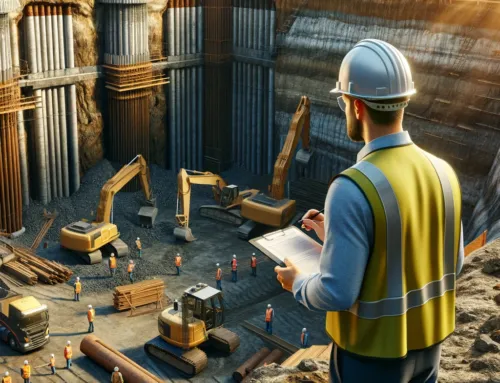Why is it important to do a soil test?
Soil testing plays a crucial role in both commercial and residential construction, serving as the foundation of geotechnical analysis for any construction project. The significance of involving a professional laboratory for soil testing cannot be overstated. This article delves into the reasons why laboratory soil testing is vital for the geotechnical analysis of your home and outlines its importance to commercial and residential structural construction development.
Understanding Soil Testing
Soil testing, in the context of geotechnical analysis, involves evaluating the soil’s physical and chemical properties to determine its suitability for construction projects. This process helps identify potential problems that could affect the stability, safety, and longevity of a structure. Soil tests can reveal information about soil strength, density, compaction, moisture content, and the presence of hazardous contaminants, which are critical factors in construction planning and design.
Nulla in tristique nibh. Phasellus porttitor leo id risus cursus. Aliquam tincidunt rutrum ante, eu vestibulum elit phare.
Using gathered data to inform the design and construction strategies that will mitigate risks associated with the geotechnical conditions

Precision & Accuracy is everything
Laboratories equipped with specialized equipment and trained personnel can provide more precise and accurate soil test results compared to field tests or do-it-yourself kits. The sophisticated technology used in labs can detect finer details and subtle variations in soil composition that might be overlooked otherwise. This level of precision is essential for making informed decisions about construction techniques, materials, and safety measures, ensuring that the foundation of a building is suitable for the soil it rests on.
Comprehensive Analysis
Our professional laboratories offer a wide range of soil tests that cover various aspects of the soil’s properties. These tests include but are not limited to, particle size analysis, Atterberg limits testing, Proctor compaction testing, permeability testing, and chemical analysis for contaminants. Such a comprehensive analysis is crucial for understanding the behavior of soil under different conditions, such as changes in moisture or load. This information is instrumental in designing foundations, retaining walls, and drainage systems that are resilient and long-lasting.
Regulatory Compliance and Standards
Construction projects must adhere to local, state, and national building codes and standards, which often include specific requirements for soil testing and analysis. Laboratories are familiar with these regulations and can ensure that their testing methods and results comply with the relevant standards. This compliance is not only a matter of legality but also assures clients and stakeholders of the project’s integrity and safety.
Risk Mitigation
The insights gained from laboratory soil tests help identify potential risks and challenges that may arise during construction or over the lifespan of a structure. For instance, discovering that soil has a high potential for shrink-swell behavior can lead to preemptive design adjustments to mitigate the risk of foundation movement. By addressing these issues early on, developers can avoid costly repairs, legal liabilities, and safety hazards in the future.
Economic Efficiency
Investing in laboratory soil testing can lead to significant cost savings over the course of a construction project. By accurately determining the soil’s characteristics, engineers can optimize the design of the foundation and other structural elements, avoiding over-engineering and unnecessary expenditure on materials. Furthermore, foreseeing and mitigating potential soil-related problems can prevent delays, additional construction phases, and expensive remediation work after the project is completed.
Customized Solutions
Every construction site is unique, and laboratory soil testing allows for tailored analysis that accounts for the specific conditions and requirements of a project. This customization ensures that the construction plan is optimized for the site’s particular soil conditions, enhancing the overall safety, stability, and performance of the structure. Whether dealing with sandy soils prone to erosion or clay soils with high expansion potential, laboratory analysis provides the data needed to design effective and reliable solutions.
Environmental Considerations
Modern construction practices emphasize sustainability and environmental stewardship. Laboratory soil testing can identify contaminants and hazardous materials in the soil, guiding the development of remediation strategies to mitigate environmental impact. Moreover, understanding the soil’s natural characteristics can aid in designing construction projects that harmonize with the surrounding ecosystem, reducing erosion, water runoff, and other adverse environmental effects.
Importance of Laboratory sample testing to residential and commercial development
For commercial and residential construction, the stakes are high when it comes to ensuring the safety, durability, and cost-effectiveness of the structures. Commercial buildings, often larger and subjected to higher loads, require a thorough understanding of soil properties to support their complex designs and functionalities. Residential homes, while generally smaller, must also be built on a solid foundation to protect the safety and investment of homeowners. Laboratory soil testing provides the detailed, accurate, and reliable data necessary for designing foundations and structural elements that meet these demands.
Conclusion
Laboratory soil testing is an indispensable component of geotechnical analysis for both commercial and residential construction projects. Its importance lies in the precision, accuracy, and comprehensive nature of the analysis it provides, which forms the basis for safe, reliable, and economically efficient construction practices. By adhering to regulatory standards, mitigating risks, and enabling customized solutions, professional soil testing laboratories ensure that the foundation of every home and commercial building is solid, stable, and suitable for the long term. Investing in quality soil testing is not just a technical necessity; it’s a commitment to safety, sustainability, and excellence in construction.
Determining soil composition, strength, density, and moisture content in the laboratory can be essential to every step of the development process.



